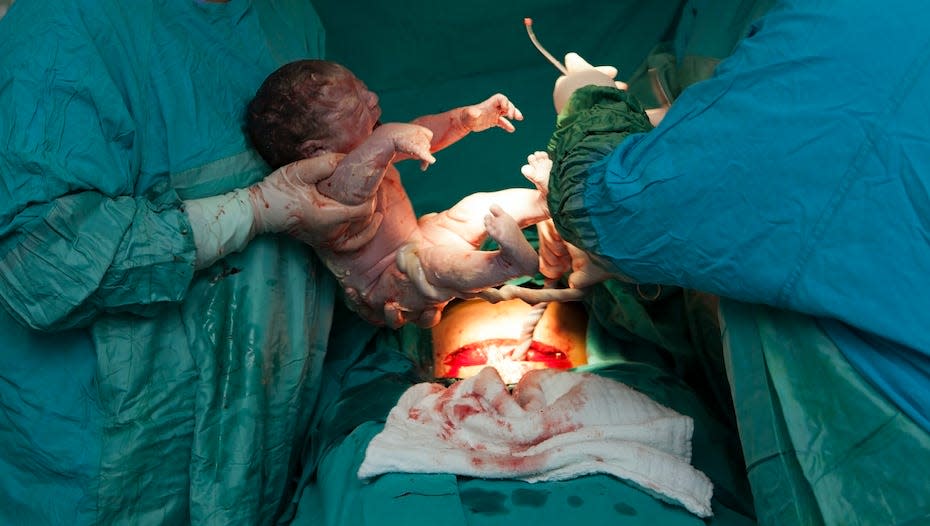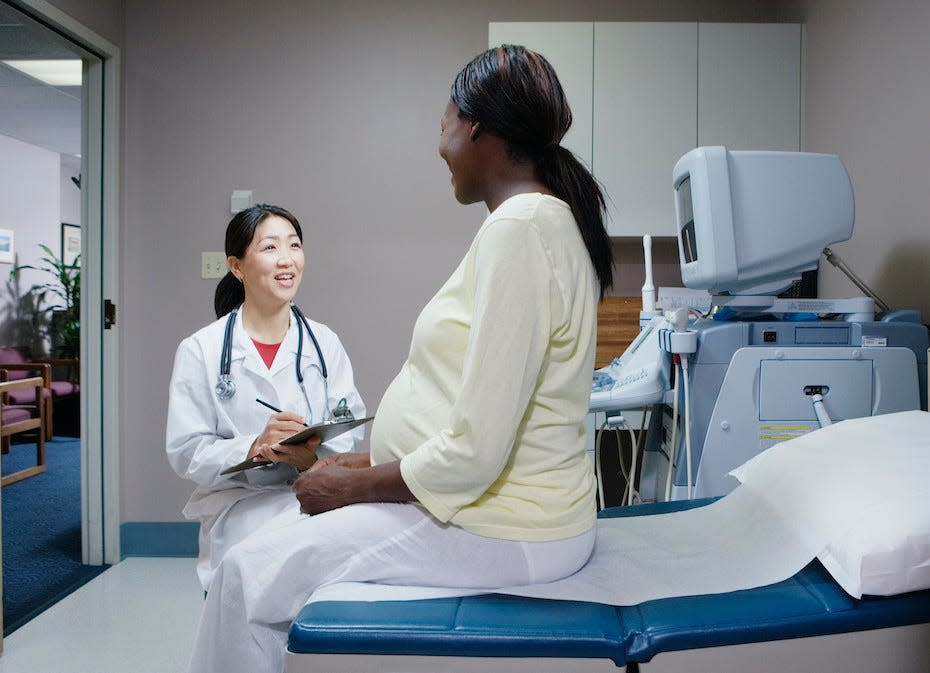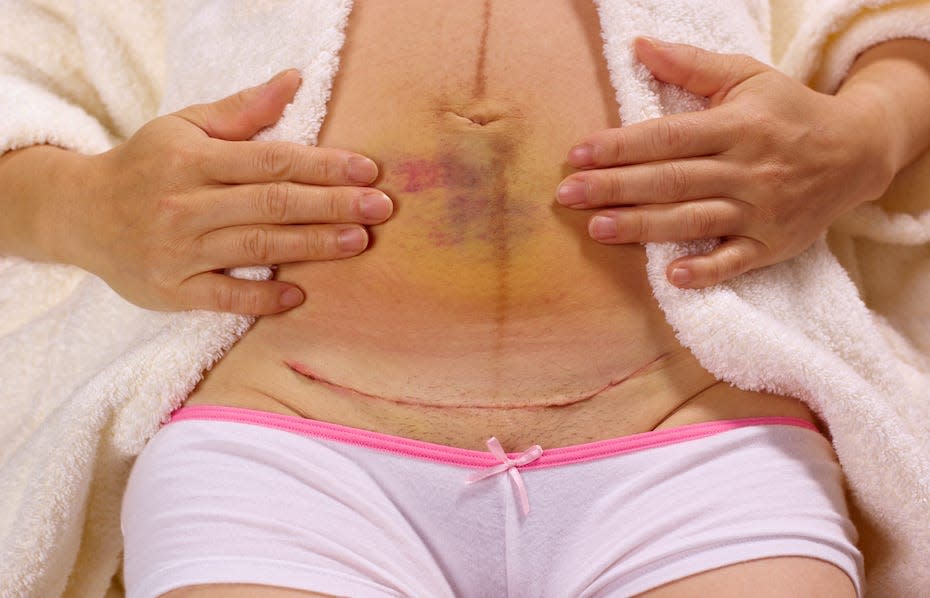Everything you need to know about having a c-section, according to a midwife
With around one in four pregnant people in the UK having a caesarean birth (according to the NHS), it's no wonder that many parents-to-be have questions about what to expect from a c-section. From how to prepare for a caesarean section to how to prioritise your recovery after having one, to mark Caesarean Section Awareness Month this April we spoke to registered midwife and co-founder of My Expert Midwife, Lesley Gilchrist, to find out everything you need to know about c-sections.
First things first, what's the likelihood that you'll have a c-section if you're expecting? "It is estimated that around 25% of babies are born via caesarean section in the UK," Gilchrist tells us. "Around 10% are elective c-sections, chosen by the mother for personal, medical or sometimes psychological reasons, these are planned ahead of time," she adds. "Around 15% are emergency or unplanned c-sections, which may be needed for many different reasons."
A full list of the reasons why a caesarean section may be carried out is available via the NHS website, but some of the reasons include:
Your baby being in the breech position
You have a low-lying placenta
You have a pregnancy-related condition like pre-eclampsia
Your baby is not getting enough oxygen
Having a planned or un-planned caesarean section
While having a caesarean section isn't always planned, Gilchrist points out that it's still worth including this as a possible outcome when you put together your birthing plan. "By doing some research, finding out what happens during a c-section and understanding the choices and options available, women and their partners can feel more prepared and in control of their birth experience if a c-section was to become the necessary or chosen way to birth their baby, whether this is planned or unplanned," she tells us.

"A birth plan is as important for women who are having a planned c-section as it is for those who are planning on giving birth vaginally. Usually, adaptations can take place to make the birth experience more personal and calmer, so women who are planning a c-section should consider their wishes in their birth plan," the midwife adds. "Even in the event of an emergency c-section, it can still be possible for some choices to be honoured."
As for how you can ensure some of your choices are honoured if your birth plan doesn't go as expected, Gilchrist says: "Some women may want for the surgical drape to be lowered so they can see their baby being born or have music played in the operating theatre." She also notes that, "unless the baby needs immediate interventions when it is born, then the parents should be able to have skin-to-skin contact straight away."
How to prepare for a caesarean section
As well as speaking with your midwife about how to incorporate the possibility of an un-planned c-section into your birthing plan, there are also some practical steps you can take to make the process easier in case you end up needing one.

"When packing your hospital bag, a few tweaks can help you be more comfortable after a c-section," Gilchrist advises. "Women will be sore and their mobility reduced, so things like an extra-long phone cable can make sure mum doesn’t need to twist or reach for her phone, whilst a long, bendy straw means she can have a drink without struggling to sit up."
She also recommends that you "pack underwear that will cover but not rub the incision" as well as "short sleeved, button-up tops that might make dressing with a drip or cannula easier."
How to prioritise recovery after a caesarean section
Wondering about c-section recovery? Coming home from the hospital with a new baby is pretty daunting – how the heck do you manage this non-stop crying, non-stop pooping addition to your home!? – and that can be exacerbated if you've also just had a major surgery, like a c-section. It's why prioritising your recovery is an absolute must, after all, looking after yourself is just as important as looking after your new arrival.
"As well as creating a birth plan and packing the hospital bag, planning and prioritising recovery is important," Gilchrist explains. "During the first few weeks after the birth, arrange for help from friends, family and your birth partner so your recovery can be prioritised."
As for exactly how to do that, the midwife advises that you delegate tasks like shopping, cooking, cleaning and looking after older children to partners, friends or family members. Doing so allows you to "rest, heal and focus on bonding and feeding with your new baby."
She also points out that figuring out how you'll get around post-birth is key. "Plan for transport in the weeks following a c-section or know your options if you are unable to drive for a period of time," she says.
How to come to terms with having a c-section scar
There are many stages to c-section scar healing, and perhaps one of the most common thoughts parents-to-be have in the lead up to a planned or un-planned caesarean section is what the scar will look like after the procedure, as well as how they can learn to accept it.
"Usually, during a c-section, the surgeon will make an incision of 10-20cm long, just below the bikini line, and this is where your scar will be," Gilchrist points out. "The process of healing begins as soon as you leave the operating theatre but can still be ongoing at a cellular level for 1-2 years."

To take care of your wound, the midwife tells us: "Once you have had your six-week check-up (or sooner if the scar is considered well-healed), you can start massaging the area around your scar. Regularly massaging the area with a simple technique and the use of a scar oil can help soften scar tissue, reduce the uneven feel and appearance of the skin and aid the breakdown of internal adhesions."
As well as the many physical benefits of massaging your scar, Gilchrist explains that doing so "can also help women reconnect their body and mind, which may help with processing feelings surrounding their birth experience."
You Might Also Like

